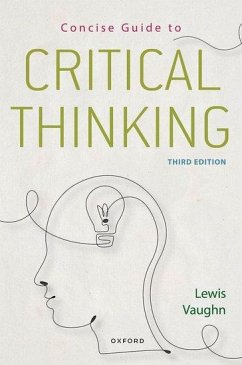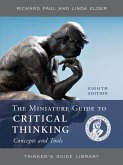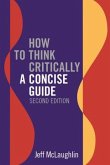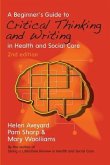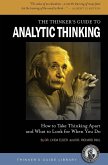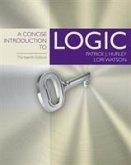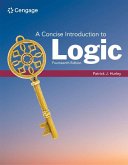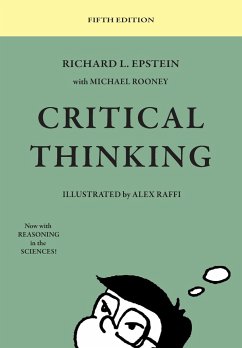Lewis Vaughn
Concise Guide to Critical Thinking
Lewis Vaughn
Concise Guide to Critical Thinking
- Broschiertes Buch
- Merkliste
- Auf die Merkliste
- Bewerten Bewerten
- Teilen
- Produkt teilen
- Produkterinnerung
- Produkterinnerung
Lewis Vaughn's Concise Guide to Critical Thinking, third Edition, offers a clear and compact introduction to critical thinking and argumentative writing. Based on his best-selling text, The Power of Critical Thinking, this affordable volume strikes a unique balance for instructors. While it is more succinct than the leading comprehensive texts, it covers more key content, and does so more effectively, than any of the briefer critical thinking handbooks.
Andere Kunden interessierten sich auch für
![The Miniature Guide to Critical Thinking Concepts and Tools The Miniature Guide to Critical Thinking Concepts and Tools]() Richard PaulThe Miniature Guide to Critical Thinking Concepts and Tools20,99 €
Richard PaulThe Miniature Guide to Critical Thinking Concepts and Tools20,99 €![How to Think Critically: A Concise Guide - Second Edition How to Think Critically: A Concise Guide - Second Edition]() Jeff McLaughlinHow to Think Critically: A Concise Guide - Second Edition43,99 €
Jeff McLaughlinHow to Think Critically: A Concise Guide - Second Edition43,99 €![A Beginner's Guide to Critical Thinking and Writing in Health and Social Care A Beginner's Guide to Critical Thinking and Writing in Health and Social Care]() Helen AveyardA Beginner's Guide to Critical Thinking and Writing in Health and Social Care33,99 €
Helen AveyardA Beginner's Guide to Critical Thinking and Writing in Health and Social Care33,99 €![Thinker's Guide to Analytic Thinking Thinker's Guide to Analytic Thinking]() Linda ElderThinker's Guide to Analytic Thinking33,99 €
Linda ElderThinker's Guide to Analytic Thinking33,99 €![A Concise Introduction to Logic A Concise Introduction to Logic]() Patrick Hurley (University of San Diego)A Concise Introduction to Logic128,99 €
Patrick Hurley (University of San Diego)A Concise Introduction to Logic128,99 €![A Concise Introduction to Logic A Concise Introduction to Logic]() Patrick Hurley (University of San Diego)A Concise Introduction to Logic126,99 €
Patrick Hurley (University of San Diego)A Concise Introduction to Logic126,99 €![Critical Thinking Critical Thinking]() Richard L EpsteinCritical Thinking57,99 €
Richard L EpsteinCritical Thinking57,99 €-
-
-
Lewis Vaughn's Concise Guide to Critical Thinking, third Edition, offers a clear and compact introduction to critical thinking and argumentative writing. Based on his best-selling text, The Power of Critical Thinking, this affordable volume strikes a unique balance for instructors. While it is more succinct than the leading comprehensive texts, it covers more key content, and does so more effectively, than any of the briefer critical thinking handbooks.
Produktdetails
- Produktdetails
- Verlag: Oxford University Press Inc
- 3 Revised edition
- Seitenzahl: 392
- Erscheinungstermin: 6. Juni 2024
- Englisch
- Abmessung: 235mm x 166mm x 20mm
- Gewicht: 570g
- ISBN-13: 9780197768365
- ISBN-10: 0197768369
- Artikelnr.: 69434289
- Herstellerkennzeichnung
- Libri GmbH
- Europaallee 1
- 36244 Bad Hersfeld
- gpsr@libri.de
- Verlag: Oxford University Press Inc
- 3 Revised edition
- Seitenzahl: 392
- Erscheinungstermin: 6. Juni 2024
- Englisch
- Abmessung: 235mm x 166mm x 20mm
- Gewicht: 570g
- ISBN-13: 9780197768365
- ISBN-10: 0197768369
- Artikelnr.: 69434289
- Herstellerkennzeichnung
- Libri GmbH
- Europaallee 1
- 36244 Bad Hersfeld
- gpsr@libri.de
Lewis Vaughn is the author or coauthor of numerous books, including Bioethics, Fifth Edition (2022), The Power of Critical Thinking, Seventh Edition, (2021), Philosophy Here and Now, fourth Edition (2021), and Living Philosophy, third Edition (2020), all published by Oxford University Press. He also publishes Doing Ethics, Fifth Edition (2018) with W.W. Norton.
Preface
CHAPTER 1 Critical Thinking, Facts, and Feelings
WHY IT MATTERS
Critical Thinking Skills Test
CLAIMS AND REASONS
REASONS AND ARGUMENTS
ARGUMENTS IN THE ROUGH
Key Words
Exercises
Self-Assessment Quiz
Writing Assignments
CHAPTER 2 Obstacles to Critical Thinking
PSYCHOLOGICAL OBSTACLES
Is It Wrong to Believe without Good Reasons?
Self-Centered Thinking
Group-Centered Thinking
Implicit Bias
Resisting Contrary Evidence
Left-Wing Right-Wing Bias
Looking for Confirming Evidence
Preferring Available Evidence
Motivated Reasoning
Homophily
Mere Exposure Effect
Illusion-of-Truth Effect
False Consensus Effect
THE DUNNING-KRUGER EFFECT
The Internet versus Critical Thinking
PHILOSOPHICAL OBSTACLES
Subjective Relativism
Social Relativism
Skepticism
Key Words
Exercises
Self-Assessment Quiz
Writing Assignments
CHAPTER 3 Identifying and Evaluating Arguments
ARGUMENT BASICS
No Arguments, Just Fluff
JUDGING ARGUMENTS
UNCOVERING IMPLIED PREMISES
The Smart Way to Argue Online
ASSESSING LONG ARGUMENTS
Key Words
Exercises
Self-Assessment Quiz
Writing Assignments
CHAPTER 4 Deductive Argument Patterns
COMMON FORMS
Modus Ponens
Modus Tollens
Hypothetical Syllogism
Disjunctive Syllogism
Invalid Argument Forms
Valid and Invalid Argument Forms
REDUCTIO AD ABSURDUM
Key Words
Exercises
Self-Assessment Quiz
Writing Assignments
CHAPTER 5 Inductive Arguments and Statistics
ENUMERATIVE INDUCTION
Sample Size
Representativeness
Mean, Median, and Mode
OPINION POLLS
How Survey Questions Go Wrong
ANALOGICAL INDUCTION
Relevant Similarities
Relevant Dissimilarities
The Number of Instances Compared
Diversity Among Cases
Key Words
Exercises
Self-Assessment Quiz
Writing Assignments
CHAPTER 6 Evidence and Experts
EXPERTS AND NONEXPERTS
Fact and Opinion
JUDGING EXPERTS
Hierarchy of Reliability
EXPERTS AND PERSONAL EXPERIENCE
I Just Know!
Impairment
Expectation
Eyewitness Testimony and Wrongful Convictions
INNUMERACY AND PROBABILITY
Key Words
Exercises
Self-Assessment Quiz
Writing Assignments
CHAPTER 7 Fake News
TAXONOMY OF MISINFORMATION
A Fake News Masterpiece
TELLING FAKE FROM REAL
Read Laterally
The Ethics of Sharing Fake News
Read Critically
Use Google and Wikipedia Carefully
Check Your Own Biases
Trustworthy Fact-Checkers
FAKE IMAGES
Key Words
Exercises
Self-Assessment Quiz
Writing Assignments
CHAPTER 8 Advertising: Commercial and Political
HOW ADVERTISING WORKS
INTERNET ADVERTISING
OLD SCHOOL ADVERTISING TRICKS
POLITICAL ADVERTISING
Key Words
Exercises
Self-Assessment Quiz
Writing Assignments
CHAPTER 9 Causal Arguments
TESTING FOR CAUSES
Agreement or Difference
Both Agreement and Difference
Correlation
CAUSAL CONFUSIONS
Misidentifying Relevant Factors
Mishandling Multiple Factors
Coincidence, Birth Dates, and US Presidents
Being Misled by Coincidence
Confusing Cause with Temporal Order
Confusing Cause and Effect
The Deadly Post Hoc Fallacy
NECESSARY AND SUFFICIENT CONDITIONS
Key Words
Exercises
Self-Assessment Quiz
Writing Assignments
CHAPTER 10 Inference to the Best Explanation
EXPLANATIONS AND INFERENCE
Darwin and the Best Explanation
THEORIES AND CONSISTENCY
THEORIES AND CRITERIA
Testability
Fruitfulness
Scope
Simplicity
Conservatism
TELLING GOOD THEORIES FROM BAD
A Doomed Flight
An Amazing Cure
Key Words
Exercises
Self-Assessment Quiz
Writing Assignments
CHAPTER 11 Judging Scientific Theories
WHAT SCIENCE IS AND IS NOT
THE SCIENTIFIC METHOD
TESTING SCIENTIFIC THEORIES
Nonintervention (Population) Studies
JUDGING SCIENTIFIC THEORIES
Copernicus Versus Ptolemy
Climate Change
Is It Too Late to Prevent Climate Change?
If the World Is Warming, Why Are Winters and Summers Still Very cold??
SCIENCE AND WEIRD THEORIES
MAKING WEIRD MISTAKES
Leaping to the Weirdest Theory
Mixing What Seems with What Is
Misunderstanding the Possibilities
JUDGING WEIRD THEORIES
Crop Circles
Eyewitness Testimony and Extraordinary Things
Talking with the Dead
Exercises
Self-Assessment Quiz
Writing Assignments
CHAPTER 12 Fallacies and Persuaders
FALLACIES: IRRELEVANT PREMISES
Genetic Fallacy
Composition
Division
Appeal to the Person
How to Respond to Ad Hominem Attacks
Equivocation
Appeal to Popularity
Appeal to Tradition
Appeal to Ignorance
Can You Prove a Negative?
Appeal to Emotion
Red Herring
Straw Man
Two Wrongs Make a Right
FALLACIES: UNACCEPTABLE PREMISES X
Begging the Question
False Dilemma
Decision-Point Fallacy
Slippery Slope
Hasty Generalization
PERSUADERS: RHETORICAL MOVES
Innuendo
Euphemisms and Dysphemisms
Stereotyping
Ridicule
Rhetorical Definitions
Key Words
Exercises
Self-Assessment Quiz
Writing Assignments
CHAPTER 13 Critical Thinking and Extremism
PARTISAN BLINDNESS
Whose Pants Are on Fire?
Political Bias and Consistency
CONSPIRACY THEORIES
Challenging Conspiracy Thinking
Key Words
Exercises
Self-Assessment Quiz
Writing Assignments
Appendix A: Answers to Exercises
Appendix B: Answers to Self-Assessment Quizzes
Appendix C: Answers to Critical Thinking Skills Test
Notes
Glossary
Credits
Index
CHAPTER 1 Critical Thinking, Facts, and Feelings
WHY IT MATTERS
Critical Thinking Skills Test
CLAIMS AND REASONS
REASONS AND ARGUMENTS
ARGUMENTS IN THE ROUGH
Key Words
Exercises
Self-Assessment Quiz
Writing Assignments
CHAPTER 2 Obstacles to Critical Thinking
PSYCHOLOGICAL OBSTACLES
Is It Wrong to Believe without Good Reasons?
Self-Centered Thinking
Group-Centered Thinking
Implicit Bias
Resisting Contrary Evidence
Left-Wing Right-Wing Bias
Looking for Confirming Evidence
Preferring Available Evidence
Motivated Reasoning
Homophily
Mere Exposure Effect
Illusion-of-Truth Effect
False Consensus Effect
THE DUNNING-KRUGER EFFECT
The Internet versus Critical Thinking
PHILOSOPHICAL OBSTACLES
Subjective Relativism
Social Relativism
Skepticism
Key Words
Exercises
Self-Assessment Quiz
Writing Assignments
CHAPTER 3 Identifying and Evaluating Arguments
ARGUMENT BASICS
No Arguments, Just Fluff
JUDGING ARGUMENTS
UNCOVERING IMPLIED PREMISES
The Smart Way to Argue Online
ASSESSING LONG ARGUMENTS
Key Words
Exercises
Self-Assessment Quiz
Writing Assignments
CHAPTER 4 Deductive Argument Patterns
COMMON FORMS
Modus Ponens
Modus Tollens
Hypothetical Syllogism
Disjunctive Syllogism
Invalid Argument Forms
Valid and Invalid Argument Forms
REDUCTIO AD ABSURDUM
Key Words
Exercises
Self-Assessment Quiz
Writing Assignments
CHAPTER 5 Inductive Arguments and Statistics
ENUMERATIVE INDUCTION
Sample Size
Representativeness
Mean, Median, and Mode
OPINION POLLS
How Survey Questions Go Wrong
ANALOGICAL INDUCTION
Relevant Similarities
Relevant Dissimilarities
The Number of Instances Compared
Diversity Among Cases
Key Words
Exercises
Self-Assessment Quiz
Writing Assignments
CHAPTER 6 Evidence and Experts
EXPERTS AND NONEXPERTS
Fact and Opinion
JUDGING EXPERTS
Hierarchy of Reliability
EXPERTS AND PERSONAL EXPERIENCE
I Just Know!
Impairment
Expectation
Eyewitness Testimony and Wrongful Convictions
INNUMERACY AND PROBABILITY
Key Words
Exercises
Self-Assessment Quiz
Writing Assignments
CHAPTER 7 Fake News
TAXONOMY OF MISINFORMATION
A Fake News Masterpiece
TELLING FAKE FROM REAL
Read Laterally
The Ethics of Sharing Fake News
Read Critically
Use Google and Wikipedia Carefully
Check Your Own Biases
Trustworthy Fact-Checkers
FAKE IMAGES
Key Words
Exercises
Self-Assessment Quiz
Writing Assignments
CHAPTER 8 Advertising: Commercial and Political
HOW ADVERTISING WORKS
INTERNET ADVERTISING
OLD SCHOOL ADVERTISING TRICKS
POLITICAL ADVERTISING
Key Words
Exercises
Self-Assessment Quiz
Writing Assignments
CHAPTER 9 Causal Arguments
TESTING FOR CAUSES
Agreement or Difference
Both Agreement and Difference
Correlation
CAUSAL CONFUSIONS
Misidentifying Relevant Factors
Mishandling Multiple Factors
Coincidence, Birth Dates, and US Presidents
Being Misled by Coincidence
Confusing Cause with Temporal Order
Confusing Cause and Effect
The Deadly Post Hoc Fallacy
NECESSARY AND SUFFICIENT CONDITIONS
Key Words
Exercises
Self-Assessment Quiz
Writing Assignments
CHAPTER 10 Inference to the Best Explanation
EXPLANATIONS AND INFERENCE
Darwin and the Best Explanation
THEORIES AND CONSISTENCY
THEORIES AND CRITERIA
Testability
Fruitfulness
Scope
Simplicity
Conservatism
TELLING GOOD THEORIES FROM BAD
A Doomed Flight
An Amazing Cure
Key Words
Exercises
Self-Assessment Quiz
Writing Assignments
CHAPTER 11 Judging Scientific Theories
WHAT SCIENCE IS AND IS NOT
THE SCIENTIFIC METHOD
TESTING SCIENTIFIC THEORIES
Nonintervention (Population) Studies
JUDGING SCIENTIFIC THEORIES
Copernicus Versus Ptolemy
Climate Change
Is It Too Late to Prevent Climate Change?
If the World Is Warming, Why Are Winters and Summers Still Very cold??
SCIENCE AND WEIRD THEORIES
MAKING WEIRD MISTAKES
Leaping to the Weirdest Theory
Mixing What Seems with What Is
Misunderstanding the Possibilities
JUDGING WEIRD THEORIES
Crop Circles
Eyewitness Testimony and Extraordinary Things
Talking with the Dead
Exercises
Self-Assessment Quiz
Writing Assignments
CHAPTER 12 Fallacies and Persuaders
FALLACIES: IRRELEVANT PREMISES
Genetic Fallacy
Composition
Division
Appeal to the Person
How to Respond to Ad Hominem Attacks
Equivocation
Appeal to Popularity
Appeal to Tradition
Appeal to Ignorance
Can You Prove a Negative?
Appeal to Emotion
Red Herring
Straw Man
Two Wrongs Make a Right
FALLACIES: UNACCEPTABLE PREMISES X
Begging the Question
False Dilemma
Decision-Point Fallacy
Slippery Slope
Hasty Generalization
PERSUADERS: RHETORICAL MOVES
Innuendo
Euphemisms and Dysphemisms
Stereotyping
Ridicule
Rhetorical Definitions
Key Words
Exercises
Self-Assessment Quiz
Writing Assignments
CHAPTER 13 Critical Thinking and Extremism
PARTISAN BLINDNESS
Whose Pants Are on Fire?
Political Bias and Consistency
CONSPIRACY THEORIES
Challenging Conspiracy Thinking
Key Words
Exercises
Self-Assessment Quiz
Writing Assignments
Appendix A: Answers to Exercises
Appendix B: Answers to Self-Assessment Quizzes
Appendix C: Answers to Critical Thinking Skills Test
Notes
Glossary
Credits
Index
Preface
CHAPTER 1 Critical Thinking, Facts, and Feelings
WHY IT MATTERS
Critical Thinking Skills Test
CLAIMS AND REASONS
REASONS AND ARGUMENTS
ARGUMENTS IN THE ROUGH
Key Words
Exercises
Self-Assessment Quiz
Writing Assignments
CHAPTER 2 Obstacles to Critical Thinking
PSYCHOLOGICAL OBSTACLES
Is It Wrong to Believe without Good Reasons?
Self-Centered Thinking
Group-Centered Thinking
Implicit Bias
Resisting Contrary Evidence
Left-Wing Right-Wing Bias
Looking for Confirming Evidence
Preferring Available Evidence
Motivated Reasoning
Homophily
Mere Exposure Effect
Illusion-of-Truth Effect
False Consensus Effect
THE DUNNING-KRUGER EFFECT
The Internet versus Critical Thinking
PHILOSOPHICAL OBSTACLES
Subjective Relativism
Social Relativism
Skepticism
Key Words
Exercises
Self-Assessment Quiz
Writing Assignments
CHAPTER 3 Identifying and Evaluating Arguments
ARGUMENT BASICS
No Arguments, Just Fluff
JUDGING ARGUMENTS
UNCOVERING IMPLIED PREMISES
The Smart Way to Argue Online
ASSESSING LONG ARGUMENTS
Key Words
Exercises
Self-Assessment Quiz
Writing Assignments
CHAPTER 4 Deductive Argument Patterns
COMMON FORMS
Modus Ponens
Modus Tollens
Hypothetical Syllogism
Disjunctive Syllogism
Invalid Argument Forms
Valid and Invalid Argument Forms
REDUCTIO AD ABSURDUM
Key Words
Exercises
Self-Assessment Quiz
Writing Assignments
CHAPTER 5 Inductive Arguments and Statistics
ENUMERATIVE INDUCTION
Sample Size
Representativeness
Mean, Median, and Mode
OPINION POLLS
How Survey Questions Go Wrong
ANALOGICAL INDUCTION
Relevant Similarities
Relevant Dissimilarities
The Number of Instances Compared
Diversity Among Cases
Key Words
Exercises
Self-Assessment Quiz
Writing Assignments
CHAPTER 6 Evidence and Experts
EXPERTS AND NONEXPERTS
Fact and Opinion
JUDGING EXPERTS
Hierarchy of Reliability
EXPERTS AND PERSONAL EXPERIENCE
I Just Know!
Impairment
Expectation
Eyewitness Testimony and Wrongful Convictions
INNUMERACY AND PROBABILITY
Key Words
Exercises
Self-Assessment Quiz
Writing Assignments
CHAPTER 7 Fake News
TAXONOMY OF MISINFORMATION
A Fake News Masterpiece
TELLING FAKE FROM REAL
Read Laterally
The Ethics of Sharing Fake News
Read Critically
Use Google and Wikipedia Carefully
Check Your Own Biases
Trustworthy Fact-Checkers
FAKE IMAGES
Key Words
Exercises
Self-Assessment Quiz
Writing Assignments
CHAPTER 8 Advertising: Commercial and Political
HOW ADVERTISING WORKS
INTERNET ADVERTISING
OLD SCHOOL ADVERTISING TRICKS
POLITICAL ADVERTISING
Key Words
Exercises
Self-Assessment Quiz
Writing Assignments
CHAPTER 9 Causal Arguments
TESTING FOR CAUSES
Agreement or Difference
Both Agreement and Difference
Correlation
CAUSAL CONFUSIONS
Misidentifying Relevant Factors
Mishandling Multiple Factors
Coincidence, Birth Dates, and US Presidents
Being Misled by Coincidence
Confusing Cause with Temporal Order
Confusing Cause and Effect
The Deadly Post Hoc Fallacy
NECESSARY AND SUFFICIENT CONDITIONS
Key Words
Exercises
Self-Assessment Quiz
Writing Assignments
CHAPTER 10 Inference to the Best Explanation
EXPLANATIONS AND INFERENCE
Darwin and the Best Explanation
THEORIES AND CONSISTENCY
THEORIES AND CRITERIA
Testability
Fruitfulness
Scope
Simplicity
Conservatism
TELLING GOOD THEORIES FROM BAD
A Doomed Flight
An Amazing Cure
Key Words
Exercises
Self-Assessment Quiz
Writing Assignments
CHAPTER 11 Judging Scientific Theories
WHAT SCIENCE IS AND IS NOT
THE SCIENTIFIC METHOD
TESTING SCIENTIFIC THEORIES
Nonintervention (Population) Studies
JUDGING SCIENTIFIC THEORIES
Copernicus Versus Ptolemy
Climate Change
Is It Too Late to Prevent Climate Change?
If the World Is Warming, Why Are Winters and Summers Still Very cold??
SCIENCE AND WEIRD THEORIES
MAKING WEIRD MISTAKES
Leaping to the Weirdest Theory
Mixing What Seems with What Is
Misunderstanding the Possibilities
JUDGING WEIRD THEORIES
Crop Circles
Eyewitness Testimony and Extraordinary Things
Talking with the Dead
Exercises
Self-Assessment Quiz
Writing Assignments
CHAPTER 12 Fallacies and Persuaders
FALLACIES: IRRELEVANT PREMISES
Genetic Fallacy
Composition
Division
Appeal to the Person
How to Respond to Ad Hominem Attacks
Equivocation
Appeal to Popularity
Appeal to Tradition
Appeal to Ignorance
Can You Prove a Negative?
Appeal to Emotion
Red Herring
Straw Man
Two Wrongs Make a Right
FALLACIES: UNACCEPTABLE PREMISES X
Begging the Question
False Dilemma
Decision-Point Fallacy
Slippery Slope
Hasty Generalization
PERSUADERS: RHETORICAL MOVES
Innuendo
Euphemisms and Dysphemisms
Stereotyping
Ridicule
Rhetorical Definitions
Key Words
Exercises
Self-Assessment Quiz
Writing Assignments
CHAPTER 13 Critical Thinking and Extremism
PARTISAN BLINDNESS
Whose Pants Are on Fire?
Political Bias and Consistency
CONSPIRACY THEORIES
Challenging Conspiracy Thinking
Key Words
Exercises
Self-Assessment Quiz
Writing Assignments
Appendix A: Answers to Exercises
Appendix B: Answers to Self-Assessment Quizzes
Appendix C: Answers to Critical Thinking Skills Test
Notes
Glossary
Credits
Index
CHAPTER 1 Critical Thinking, Facts, and Feelings
WHY IT MATTERS
Critical Thinking Skills Test
CLAIMS AND REASONS
REASONS AND ARGUMENTS
ARGUMENTS IN THE ROUGH
Key Words
Exercises
Self-Assessment Quiz
Writing Assignments
CHAPTER 2 Obstacles to Critical Thinking
PSYCHOLOGICAL OBSTACLES
Is It Wrong to Believe without Good Reasons?
Self-Centered Thinking
Group-Centered Thinking
Implicit Bias
Resisting Contrary Evidence
Left-Wing Right-Wing Bias
Looking for Confirming Evidence
Preferring Available Evidence
Motivated Reasoning
Homophily
Mere Exposure Effect
Illusion-of-Truth Effect
False Consensus Effect
THE DUNNING-KRUGER EFFECT
The Internet versus Critical Thinking
PHILOSOPHICAL OBSTACLES
Subjective Relativism
Social Relativism
Skepticism
Key Words
Exercises
Self-Assessment Quiz
Writing Assignments
CHAPTER 3 Identifying and Evaluating Arguments
ARGUMENT BASICS
No Arguments, Just Fluff
JUDGING ARGUMENTS
UNCOVERING IMPLIED PREMISES
The Smart Way to Argue Online
ASSESSING LONG ARGUMENTS
Key Words
Exercises
Self-Assessment Quiz
Writing Assignments
CHAPTER 4 Deductive Argument Patterns
COMMON FORMS
Modus Ponens
Modus Tollens
Hypothetical Syllogism
Disjunctive Syllogism
Invalid Argument Forms
Valid and Invalid Argument Forms
REDUCTIO AD ABSURDUM
Key Words
Exercises
Self-Assessment Quiz
Writing Assignments
CHAPTER 5 Inductive Arguments and Statistics
ENUMERATIVE INDUCTION
Sample Size
Representativeness
Mean, Median, and Mode
OPINION POLLS
How Survey Questions Go Wrong
ANALOGICAL INDUCTION
Relevant Similarities
Relevant Dissimilarities
The Number of Instances Compared
Diversity Among Cases
Key Words
Exercises
Self-Assessment Quiz
Writing Assignments
CHAPTER 6 Evidence and Experts
EXPERTS AND NONEXPERTS
Fact and Opinion
JUDGING EXPERTS
Hierarchy of Reliability
EXPERTS AND PERSONAL EXPERIENCE
I Just Know!
Impairment
Expectation
Eyewitness Testimony and Wrongful Convictions
INNUMERACY AND PROBABILITY
Key Words
Exercises
Self-Assessment Quiz
Writing Assignments
CHAPTER 7 Fake News
TAXONOMY OF MISINFORMATION
A Fake News Masterpiece
TELLING FAKE FROM REAL
Read Laterally
The Ethics of Sharing Fake News
Read Critically
Use Google and Wikipedia Carefully
Check Your Own Biases
Trustworthy Fact-Checkers
FAKE IMAGES
Key Words
Exercises
Self-Assessment Quiz
Writing Assignments
CHAPTER 8 Advertising: Commercial and Political
HOW ADVERTISING WORKS
INTERNET ADVERTISING
OLD SCHOOL ADVERTISING TRICKS
POLITICAL ADVERTISING
Key Words
Exercises
Self-Assessment Quiz
Writing Assignments
CHAPTER 9 Causal Arguments
TESTING FOR CAUSES
Agreement or Difference
Both Agreement and Difference
Correlation
CAUSAL CONFUSIONS
Misidentifying Relevant Factors
Mishandling Multiple Factors
Coincidence, Birth Dates, and US Presidents
Being Misled by Coincidence
Confusing Cause with Temporal Order
Confusing Cause and Effect
The Deadly Post Hoc Fallacy
NECESSARY AND SUFFICIENT CONDITIONS
Key Words
Exercises
Self-Assessment Quiz
Writing Assignments
CHAPTER 10 Inference to the Best Explanation
EXPLANATIONS AND INFERENCE
Darwin and the Best Explanation
THEORIES AND CONSISTENCY
THEORIES AND CRITERIA
Testability
Fruitfulness
Scope
Simplicity
Conservatism
TELLING GOOD THEORIES FROM BAD
A Doomed Flight
An Amazing Cure
Key Words
Exercises
Self-Assessment Quiz
Writing Assignments
CHAPTER 11 Judging Scientific Theories
WHAT SCIENCE IS AND IS NOT
THE SCIENTIFIC METHOD
TESTING SCIENTIFIC THEORIES
Nonintervention (Population) Studies
JUDGING SCIENTIFIC THEORIES
Copernicus Versus Ptolemy
Climate Change
Is It Too Late to Prevent Climate Change?
If the World Is Warming, Why Are Winters and Summers Still Very cold??
SCIENCE AND WEIRD THEORIES
MAKING WEIRD MISTAKES
Leaping to the Weirdest Theory
Mixing What Seems with What Is
Misunderstanding the Possibilities
JUDGING WEIRD THEORIES
Crop Circles
Eyewitness Testimony and Extraordinary Things
Talking with the Dead
Exercises
Self-Assessment Quiz
Writing Assignments
CHAPTER 12 Fallacies and Persuaders
FALLACIES: IRRELEVANT PREMISES
Genetic Fallacy
Composition
Division
Appeal to the Person
How to Respond to Ad Hominem Attacks
Equivocation
Appeal to Popularity
Appeal to Tradition
Appeal to Ignorance
Can You Prove a Negative?
Appeal to Emotion
Red Herring
Straw Man
Two Wrongs Make a Right
FALLACIES: UNACCEPTABLE PREMISES X
Begging the Question
False Dilemma
Decision-Point Fallacy
Slippery Slope
Hasty Generalization
PERSUADERS: RHETORICAL MOVES
Innuendo
Euphemisms and Dysphemisms
Stereotyping
Ridicule
Rhetorical Definitions
Key Words
Exercises
Self-Assessment Quiz
Writing Assignments
CHAPTER 13 Critical Thinking and Extremism
PARTISAN BLINDNESS
Whose Pants Are on Fire?
Political Bias and Consistency
CONSPIRACY THEORIES
Challenging Conspiracy Thinking
Key Words
Exercises
Self-Assessment Quiz
Writing Assignments
Appendix A: Answers to Exercises
Appendix B: Answers to Self-Assessment Quizzes
Appendix C: Answers to Critical Thinking Skills Test
Notes
Glossary
Credits
Index

